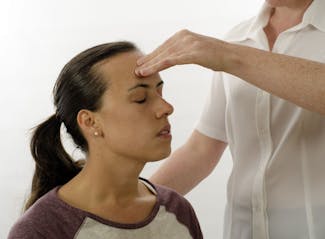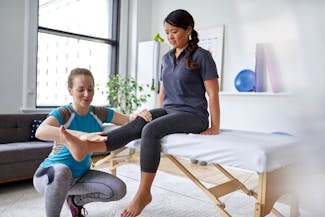
3D PT provides comprehensive physical therapy services for adults and children with a variety of nervous system disorders including:
- Balance disorders
- CVA (stroke)
- CP (cerebral palsy)
- Lou Gehrig’s disease (ALS)
- Multiple Sclerosis
- Parkinson’s Disease
- Many more
Our skilled services start with a thorough initial evaluation where we discuss and assess the patient’s specific need so we can provide a personalized physical rehabilitation program. We examine your movement, strength, flexibility, functional, balance, and muscle tone.
It’s important for us also to work closely with your doctor and any other healthcare providers so we can achieve your specific goals in a timely manner.
Our Neuro Rehab Care
Our physical therapy team use a variety of treatment techniques and modalities including:
- Adaptive equipment for safe & successful return to sports and recreation
- Assistive device fitting & training
- Education and training in compensatory strategies to recover function
- Gait Training with use of assistive equipment/devices
- Neuromuscular re-education
- Seating assessment and wheelchair instruction
- Splinting, bracing and the use of specialized therapy equipment
- Therapeutic exercise and balance activities

Post-Surgical Physical Therapy
We are experts in the art and science of the evaluation and treatment of human movement dysfunctions. We have successfully rehabilitated patients that have undergone a variety of surgical interventions including:
- Total Hip, Knee, Shoulder Replacement
- Neck Fusion
- Arthroscopic Surgical Repairs
- Rotator Cuff Repairs
- Subacromial Decompression
- Lumbar Laminectomy/Fusion/Discectomy
- Knee Meniscectomy
- ACL/PCL Reconstruction
We Work Closely with Your Surgeon
Communication is important for optimal recover after a surgical procedure. We follow a number of post-surgical protocols and take the necessary steps to optimize healing. We will be in contact with your referring physician for guidance regarding any precautions and/or recommendations based on your particular procedure.
Goals of the Rehabilitation Process
- Recovery of joint motion
- Recovery of strength
- Pain relief
- Improved function
- Independent care
Components of Your Care:
- A thorough biomechanical evaluation
- Extensive patient education
- Gentle hands-on techniques to relax the muscles
- Effective joint mobilization techniques to decrease stiffness
- Passive, active-assistive & active range of motion techniques
- Pain-relieving modalities
- Progressive strength training
- Targeted stretching for tight muscles
- Functional re-education
Recovery Times will Vary
Everyone is different. You may require one or two visits, or an extended care plan over several weeks depending upon the procedure, your health, level of physical fitness and a number of other factors.
